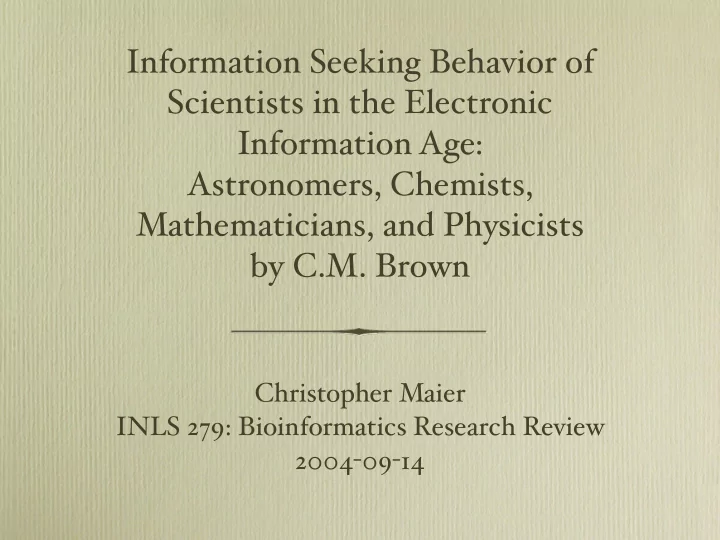

Information Seeking Behavior of Scientists in the Electronic Information Age: Astronomers, Chemists, Mathematicians, and Physicists by C.M. Brown Christopher Maier INLS 279: Bioinformatics Research Review 2004 - 09 - 14
Setting The Stage • 1999 - Internet use becoming widespread • Primary importance placed on refereed journals in print • Prediction that, with Internet, all scienti fi c dissemination will eventually take place electronically • How valid is this assumption?
This Article • Survey of scientists at the University of Oklahoma ( Norman, OK ) • How have these scientists ’ information needs and seeking habits been a ff ected by the changing electronic information environment? • Determine course the scienti fi c libraries must take in the future to accommodate these changes
Di ff erent Disciplines, Di ff erent Information Usage • Chemists - “ continuous and on - demand ” needs, rely heavily on current journals • Mathematicians - older material more important, in addition to monographs • Physicists and Astronomers - current journals, as well as reliance on pre - print archives
The Survey • Email questionnaire • How do you use the library in general, the university library system in particular, indexing/abstracting tools at the university?
The Respondents
Professor Chemistry / Biochemistry Associate Professor Mathematics Assistant Professor Physics / Astronomy Visiting Professor Other 4 % 2 % 10 % 31 % 41 % 22 % 62 % 29 % Field of Study Position
0 - 5 0 - 5 Y ears 6 - 10 6 - 10 Y ears 11 - 15 10 - 15 Y ears 16 - 20 > 15 Y ears > 20 15 % 22 % 23 % 43 % 29 % 19 % 22 % 15 % 14 % Y ears at OU Publications / Y ear
Library Resources • Chemistry / Mathematics Library • 70,000 V olumes, 500 Journal Titles • Physics / Astronomy Library • 35, 000 V olumes, 185 Journal Titles
Current Information • Chemists use current awareness services • Mathematicians and Physicists / Astronomers use personal communication and conference attendance
Less Recent Information • Article Citations are important for all • Personal communication important for Mathematicians • One mathematician commented on the desire to have bibliographic service in electronic form
Index and Abstract Tool Usage • Chemists - Many used printed CA, few used Medline, while some used outside services at personal • Mathematicians seemed to use an array of print and electronic services • Physicists / Astronomers use services provided by OU infrequently
Obtaining Articles • Everyone photocopies from the library • Non - Chemists request reprints from authors • About 2/3 of all researchers favored print over electronic format • Comment: electronic format preferred only if “ printable ”
What do the researchers � ant? • Generally pleased with existing library services • W ant access to all available electronic journals and bibliographic sources • Personal searching of titles, abstracts, and full text, followed by download and hard - copy printout
Conclusion • “ science librarians must be aware of how the scientists they serve prefer to access information ” • “ a primary goal ... should be to obtain access to as many appropriate electronic bibliographic fi nding aids and databases possible ”
Conclusion Concluded • Remember: this is at one institution, talking with 49 researchers. Y our mileage may vary. • Also, it was in 1999. Internet is a lot di ff erent now. • Take home message, though: Don ’ t assume behaviors - actually investigate! Results may surprise you.
Recommend
More recommend